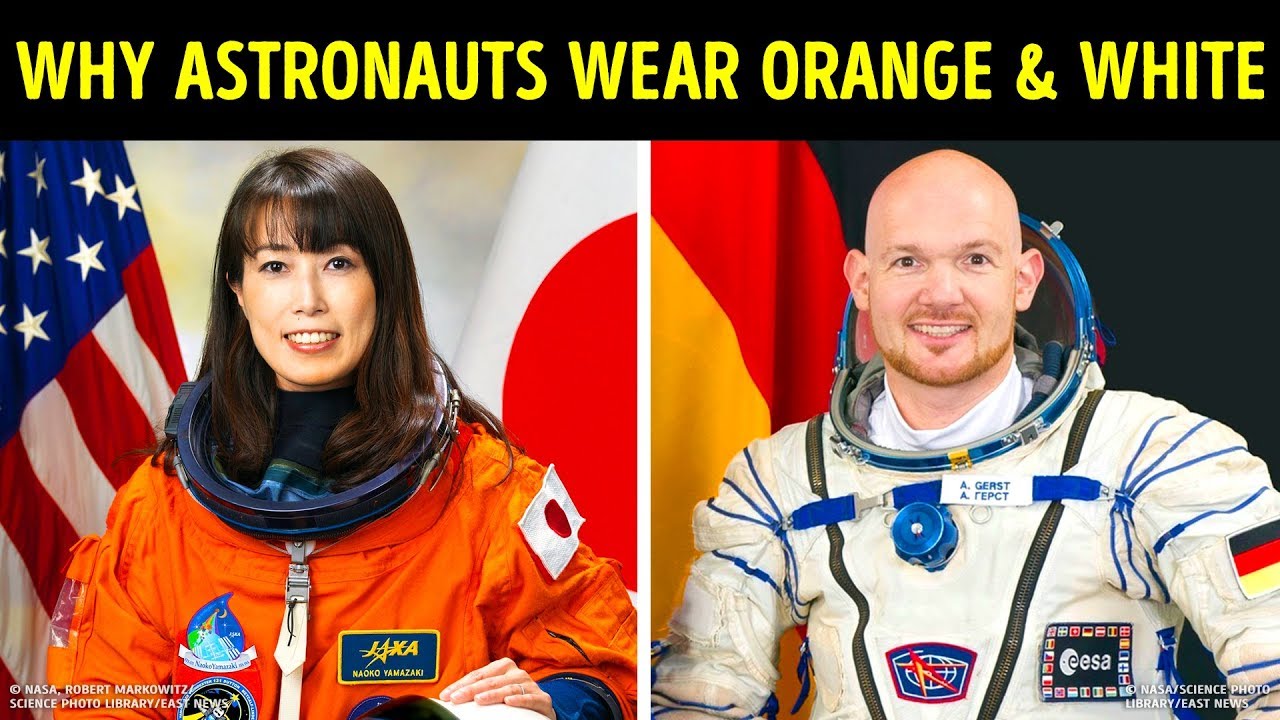Why Astronauts Wear Orange and White
The bright orange color astronauts wear to go out for launch is called International Orange, and it’s the same shade as the paint that coats Tokyo Tower in Japan, and the Golden Gate Bridge in San Francisco. However, once astronauts are in space, they swap orange for snow-white wear. So what gives with the different colors?
Well, there are actually two main types of spacesuits. The first one is the Advanced Crew Escape Suit, aka the “orange suit,” aka the “pumpkin suit.” Astronauts wear this full-pressure suit during “lift-off”. These spacesuits are crucial for those who are heading for super high altitudes. But still, why this color? And what about the white, bulky spacesuits? What’s their purpose?
Other videos you might like:
Why Airplanes Are White https://www.youtube.com/watch?v=KchRdiTzDz0&
A Potentially Habitable Super Earth Has Been Discovered https://www.youtube.com/watch?v=6dUYK41ElO0&
What Would a Journey to the Black Hole Be Like? https://www.youtube.com/watch?v=uRCX33VWOX0&
TIMESTAMPS:
Pumpkin suit 0:31
EVA suit 1:37
How to have fun on board the ISS 3:34
Why astronauts get rid of their clothes 3:50
The first American space station 4:07
? This fact is really funny ? 4:29
Why all American astronauts have to learn Russian 5:03
Space adaptation 5:35
Underwater training 6:22
How they sneeze inside a spacesuit 7:36
How they sleep ? 8:52
How they take shower ? 9:04
#ISS #astronauts #brightside
Preview photo credit:
Naoko Yamazaki (born 1970), Japanese astronaut: By NASA, Robert Markowitz/Science Photo Library/East News, https://www.eastnews.ru/pictures/picture/id/67936693/i/21/t/24
International Space Station (ISS) astronaut, backup crew for Expedition 54-55: German astronaut Alexander Gerst of the European Space Agency: By NASA/Science Photo Library/East News, https://www.eastnews.ru/pictures/picture/id/67936695/i/22/t/24
Animation is created by Bright Side.
Credit: NASA Image and Video Library and NASA 3d Resources
Space Center Houston Skylab work area: By Pi3.124 – Own work, CC BY-SA 4.0 https://creativecommons.org/licenses/by-sa/4.0, https://commons.wikimedia.org/w/index.php?curid=52002113
Samantha Cristoforetti performing the Valsalva manoeuvre during pressurization of the Russian Sokol space suit. Via Flickr: By Samantha Cristoforetti – https://www.flickr.com/photos/astrosamantha/6382057049/, CC BY 2.0 https://creativecommons.org/licenses/by/2.0, https://commons.wikimedia.org/w/index.php?curid=32324145
Animation is created by Bright Side.
SUMMARY:
– The orange suit is equipped with different stuff that can help an astronaut to survive if something goes wrong during the launch or landing of the spaceship.
– Astronauts wear EVA suits when they go on a spacewalk! Such an outfit can protect them from the unfriendly conditions of outer space, what with its extreme temperatures and near-vacuum!
– In case the tether tears, the EVA suit has a backup system. This system includes small jet thrusters which can be controlled from the station with the help of a joystick.
– Months after coming back from long missions in space, astronauts still tend to let go of things while they’re still in mid-air.
– There was an astronaut who’d been waiting for a whopping 19 years before he finally flew to space.
– All American astronauts have to learn Russian to be able to run the International Space Station using Russian-language manuals, if there’s no alternative.
– During space adaptation, 50% to 75% of astronauts have highly unpleasant syndromes, such as vertigo, headaches, nausea, and overall tiredness.
– When astronauts are in space, they often see random flashes of light – and it’s not hallucinations!
– Before going to space, astronauts have underwater training, which is supposed to simulate zero gravity.
– According to NASA, they accept only 8 applicants out of 6,000! On top of that, the selection process takes around 18 months!
– If an astronaut cries in space, tears don’t flow down their face. Instead, they gather into thick blobs of liquid around their eyes because the water surface tension holds tears together.
– Astronauts who forget to attach themselves to something when they sleep can easily float away and bump into a hard surface.
– Astronauts see a sunrise and a sunset every 45 minutes, which totals 15-16 sunsets and sunrises each day.
Music by Epidemic Sound https://www.epidemicsound.com/
Subscribe to Bright Side : https://goo.gl/rQTJZz
—————————————————————————————-
Our Social Media:
Facebook: https://www.facebook.com/brightside/
Instagram: https://www.instagram.com/brightgram/
5-Minute Crafts Youtube: https://www.goo.gl/8JVmuC
Stock materials (photos, footages and other):
https://www.depositphotos.com
https://www.shutterstock.com
https://www.eastnews.ru
—————————————————————————————-
For more videos and articles visit:
http://www.brightside.me/



![[ID: jvNU5bwzclI] Youtube Automatic](https://bizimtube.com/wp-content/uploads/2021/03/id-jvnu5bwzcli-youtube-automatic-236x133.jpg)
![[ID: 0yCJMt9Mx9c] Youtube Automatic](https://bizimtube.com/wp-content/uploads/2021/03/id-0ycjmt9mx9c-youtube-automatic-236x133.jpg)
![[ID: vAJM5EdDwjU] Youtube Automatic](https://bizimtube.com/wp-content/uploads/2021/03/id-vajm5eddwju-youtube-automatic-236x133.jpg)
![[ID: LxOmofEFub4] Youtube Automatic](https://bizimtube.com/wp-content/uploads/2021/03/id-lxomofefub4-youtube-automatic-236x133.jpg)
![[ID: wFAh77GBsHs] Youtube Automatic](https://bizimtube.com/wp-content/uploads/2021/03/id-wfah77gbshs-youtube-automatic-236x133.jpg)
![[ID: tjwrG4Debc4] Youtube Automatic](https://bizimtube.com/wp-content/uploads/2021/03/id-tjwrg4debc4-youtube-automatic-236x133.jpg)
![[ID: _28bYGZtnU8] Youtube Automatic](https://bizimtube.com/wp-content/uploads/2021/03/id-28bygztnu8-youtube-automatic-236x133.jpg)
![[ID: 1e7bhUjUEJ8] Youtube Automatic](https://bizimtube.com/wp-content/uploads/2021/03/id-1e7bhujuej8-youtube-automatic-236x133.jpg)
![[ID: QjyCviSKY2U] Youtube Automatic](https://bizimtube.com/wp-content/uploads/2021/03/id-qjycvisky2u-youtube-automatic-236x133.jpg)
![[ID: -5i-vB4-kFk] Youtube Automatic](https://bizimtube.com/wp-content/uploads/2021/03/id-5i-vb4-kfk-youtube-automatic-236x133.jpg)
![[ID: covHhQgr5kU] Youtube Automatic](https://bizimtube.com/wp-content/uploads/2021/03/id-covhhqgr5ku-youtube-automatic-236x133.jpg)
![[ID: mX7FEHws43A] Youtube Automatic](https://bizimtube.com/wp-content/uploads/2021/03/id-mx7fehws43a-youtube-automatic-236x133.jpg)